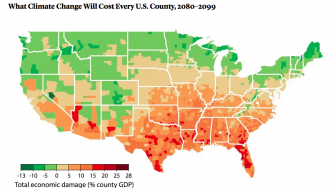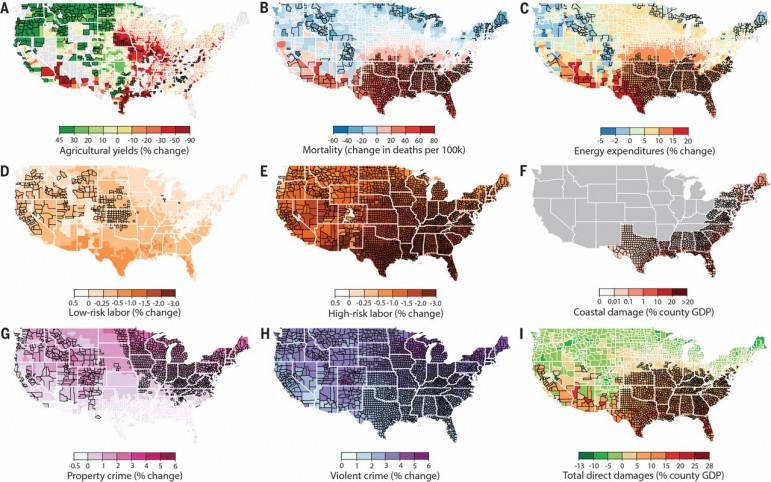Climate Change Analysis Predicts Losses for South
Scientists and economists have put together a detailed new analysis of potential economic damage from climate change in the United States. The study, published in the journal “Science,” uses decades of data to make predictions down to the county level. One takeaway: Alabama and the rest of the South could suffer more than other parts of the country. Higher energy bills, crop failures, and heat strokes are just some of the factors that will hurt economies across the South, according to the study.
The University of California at Berkeley’s James Rising, who co-authored the report, says, “Alabama stands to lose about three times the national average in its income, and that’s mostly driven by big increases in death rates.”
That can include mortality from heatwaves and associated diseases and accidents. The study predicts climate-change-related deaths in Alabama will roughly double those from car accidents by the end of the century. It also forecasts that the wealth gap between North and South will widen.
“What we find is that climate change is going to exacerbate inequality,” says Rising, “both because the South is already hotter and poorer, and because the North is actually going to, in some areas, get benefits from milder winters.”
But in Alabama, addressing climate change is not a political priority.
John Christy, Alabama’s State Climatologist, explains to companies thinking about moving to Alabama how the local climate can work to their advantage. And he says the study is just wrong.
“Climate models just aren’t reliable in terms of telling us about what’s going on now and what’s going on in the future,” he says. “The evidence for a disastrously changing climate is pretty thin.”
One thing Christy and the study authors agree on is the need to be prepared for hot and extreme weather. James Rising says there are many ways to do that. “Cities can paint the tops of their buildings white. They can plant more green spaces, make sure that they have plenty of water and air conditioning. And farmers can make sure that they invest in irrigation,” he says.
Rising says the new study is meant to help businesses, government, and other institutions better assess climate risks and make “more rational policies … We’re not trying to describe some kind of catastrophe that’s going to at some point just ‘click on.’ Climate change is going to become progressively more and more damaging and going to impact more more people, and having in hand the kind of kind of understanding that lets you choose as a society how much you’re willing to lose can really help make for better policy making.”

Trump says he is ‘not happy’ with the Iran nuclear talks but indicates he’ll give them more time
U.S. President Donald Trump said Friday he's "not happy" with the latest talks over Iran's nuclear program but indicated he would give negotiators more time to reach a deal to avert another war in the Middle East.
Bill Clinton says he ‘did nothing wrong’ with Epstein as he faced grilling over their relationship
Former President Bill Clinton told members of Congress on Friday that he "did nothing wrong" in his relationship with Jeffrey Epstein and saw no signs of Epstein's sexual abuse as he faced hours of grilling from lawmakers over his connections to the disgraced financier from more than two decades ago.
Pentagon puts Scouts ‘on notice’ over DEI and girl-centered policies
After threatening to sever ties with the organization formerly known as the Boy Scouts, Defense Secretary Hegseth announced a 6-month reprieve
President Trump bans Anthropic from use in government systems
Trump called the AI lab a "RADICAL LEFT, WOKE COMPANY" in a social media post. The Pentagon also ordered all military contractors to stop doing business with Anthropic.
HUD proposes time limits and work requirements for rental aid
The rule would allow housing agencies and landlords to impose such requirements "to encourage self-sufficiency." Critics say most who can work already do, but their wages are low.
Paramount and Warner Bros’ deal is about merging studios, and a whole lot more
The nearly $111 billion marriage would unite Paramount and Warner film studios, streamers and television properties — including CNN — under the control of the wealthy Ellison family.






